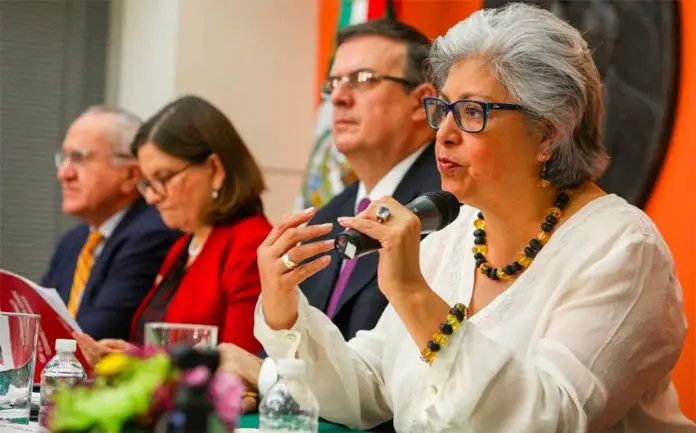Slapping tariffs on Mexican exports to the United States will not slow down Central American migration flows, Foreign Secretary Marcelo Ebrard said today.
Ebrard told a press conference at the Mexican embassy in Washington that “the imposition of tariffs together with the [United States’] decision to cancel aid programs in northern Central American countries could have a counter-productive effect and not reduce migration flows.”
He explained that “the tariffs could cause financial and economic instability,” which would reduce Mexico’s “capacity to deal with migration and offer alternatives to new migrants,” most of whom come from the Northern Triangle countries of Honduras, El Salvador and Guatemala.
President Donald Trump announced Thursday that he was placing a 5% tariff on all goods from Mexico to pressure the country to stop the movement of undocumented migrants across its northern border.
President López Obrador promptly dispatched a Mexican delegation led by Ebrard to the United States capital, where meetings with United States officials aimed at reaching a deal to stop the tariffs are taking place this week.
The foreign secretary told reporters that Mexico is already implementing measures to stop migrants reaching the border, pointing out that the government has offered many the opportunity to apply for refugee status.
In the first five months of the year, 24,451 people applied for asylum in Mexico, Ebrard said, adding that “if current trends continue, the number could reach more than 60,000 at the end of 2019.”
He also said that more than 80,000 migrants and 400 persons involved in people smuggling have been arrested in Mexico since the new government took office in December.
“Without these efforts . . . an additional quarter million migrants would arrive at the United States border in 2019,” Ebrard said.
The secretary added that Mexico wants to work with the United States to address the root causes of migration from Central American countries – namely poverty and violence.
Late last month, Mexico proposed that the United States fund seven development projects aimed at generating economic opportunities and well-being in Central America and stemming the northward flow of migrants.
“Mexico has the belief that . . . attending to the causes of migration will provide an answer to this problem,” Ebrard said.
“[We will] continue working with the United States to deal with issues of common interest. We want our governments to remain friends and partners.”
Ebrard is expected to meet with Secretary of State Mike Pompeo this week to try to dissuade the imposition of the new tariffs, and President López Obrador said Saturday that he expected “good results” from the bilateral talks.
However, Trump said yesterday “we want action, not talk,” declaring that Mexico could “solve the border crisis in one day if they so desired.”
Source: Milenio (sp)
